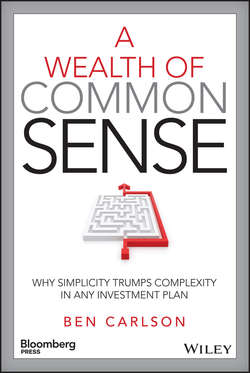Читать книгу A Wealth of Common Sense - Carlson Ben - Страница 6
На сайте Литреса книга снята с продажи.
Introduction:
Why Simplicity Is the New Sophistication
Noise
ОглавлениеThe information available to everyone on the planet is growing at an exponential rate. Anyone with a smartphone today has better mobile phone capabilities than the president of the United States did 25 years ago. We have better access to information than the president had 15 years ago.4 We now have an unprecedented amount of information at our fingertips anytime we want it. There's up-to-the-minute, 24-hour news coverage. We can communicate with anyone we want no matter where they live through e-mail or social media at the click of a button. Every financial market from around the globe can be followed on a tick-by-tick basis. We can now trade stocks on our smartphones. There's no way to escape the deluge of news and financial information that the media throws at you.
Nobel Prize–winning psychologist Daniel Kahneman showed in his research that because of a bias called the affect heuristic, the human brain is very quick to make judgments and decisions based on intuitive feelings that require little thought or deliberation. The sheer amount of information available today makes it easier than ever to use these quick hunches to tell us how to act. There are times when this type of response can work in your favor, but investing is not one of them. Kahneman also found that there is another part of the brain that is much more effective in using a logical and deliberate process to think things through. This is the part of the brain that should be used for thoughtful, deliberate financial decisions. Kahneman says, “If there is time to reflect, slowing down is likely to be a good idea.”5
Information flow will only continue to speed up in the future, so we have ourselves a conundrum. It will become more and more important to separate the meaningful from the meaningless as most people will be continuously trying to drink from the fire hose of information instead of focusing on the truly important areas that they can control. This illusion of control is more likely when many choices are available, there is a large amount of information available, and you have a personal stake in the outcome of the choice.6 This is basically a description of the portfolio management process. We all like to think that more choices must be better, but as the number of choices grows, so, too, do the number of decisions and the likelihood of making a mistake.
For example, there are now over 77,000 mutual funds to choose from worldwide.7 As the number of investment options available to investors continues to increase there is the assumption that complex approaches must be better. In fact, I will show that less is always more and trying to implement a more interesting or clever portfolio strategy is akin to threading the needle. Sure, it can work, but trying harder and increasing the number of decisions you make only increases the odds that you'll make a mistake.
The financial markets are a messy, complex system that is constantly evolving. But the answer to a complex system isn't necessarily a complex investment portfolio that requires constant activity. On the contrary, the best response to the complexities inherent in the markets is a portfolio management process that relies heavily on simplicity, transparency, and reduced levels of activity. One of the ultimate status symbols in the financial world is to consider yourself a sophisticated investor. This word invokes feelings of superiority and privilege. Sophistication is defined as having a great deal of experience, wisdom, and the ability to interpret complex issues. But sophistication does not mean that you have to utilize complexity, just that you understand it. Nassim Taleb explains this dynamic in his book Antifragile:
A complex system, contrary to what people believe, does not require complicated systems and regulations and intricate policies. The simpler, the better. Complications lead to multiplicative chains of unanticipated effects. [..] Yet simplicity has been difficult to implement in modern life because it is against the spirit of a certain brand of people who seek sophistication so they can justify their profession.8
In his classic book, Winning the Loser's Game, investor and author Charles Ellis shares the tale of his two best friends. Both were at the peak of their careers in the medical field, each with a distinguished track record. The two friends agreed that there were two discoveries in the field of medicine that were far and away the most important breakthroughs in enhancing people's health and longevity – penicillin and having doctors and nurses wash their hands. Ellis concluded this story by sharing the lesson that advice doesn't have to be complicated to be good.
4
Peter Diamondis, Abundance: The Future Is Better Than You Think (New York: Free Press, 2014).
5
Daniel Kahneman, Thinking, Fast and Slow (New York: Farrar, Straus, & Giroux, 2011).
6
Richard Peterson, Inside the Investor's Brain: The Power of Mind Over Money (Hoboken, NJ: John Wiley & Sons, 2007).
7
Investment Company Institute, 2014 Investment Company Factbook: A Review of Trends and Activities in the U.S. Investment Company Industry 54th Edition.
8
Nassim Nicholas Taleb, Antifragile: Things That Gain from Disorder (New York: Random House. 2014).
